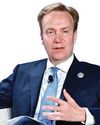
ONLINE MISINFORMATION ABOUT A TRIPLE murder sparked Britain's worst riots in 13 years, and an international debate about the failure of social media platforms to police hate speech and false reports.
The attacks targeted immigrants, and broke out in predominantly English towns and cities as well as Northern Ireland. Far-right groups were recorded looting, attacking police and locals, and performing Nazi salutes. Mobs chanting "Send them home" and "Islam out" destroyed mosques and graffitied racial slurs on homes. In some of the more violent instances, rioters stormed hotels housing asylum seekers. In one case, a fire was set while guests and staff were inside.
Prime Minister Keir Starmer condemned the violence as "far-right thuggery" and later called on large social media companies to police hate that is "whipped up online." Following an emergency Downing Street meeting on Aug. 5, Starmer pledged a "standing army" of 6,000 specialist officers to tackle violent outbreaks.
Hundreds of arrests were made in connection with the attacks, including for stirring racial hatred online. The uprisings were organized on social media following the spread of misinformation that the fatal stabbing of three young girls at a dance class in Southport, a town in northwest England, was carried out by a Muslim immigrant. The violence first erupted on July 30, near the scene of the stabbing, with hundreds of masked people gathering to throw bricks and rocks at a Southport mosque.
This story is from the August 26, 2024 edition of Time.
Start your 7-day Magzter GOLD free trial to access thousands of curated premium stories, and 9,000+ magazines and newspapers.
Already a subscriber ? Sign In
This story is from the August 26, 2024 edition of Time.
Start your 7-day Magzter GOLD free trial to access thousands of curated premium stories, and 9,000+ magazines and newspapers.
Already a subscriber? Sign In

Q & A: Borge Brende
The World Economic Forum president talks with TIME editor Sam Jacobs

Q & A - Rene Haas
Arm's CEO on how his hardware is supporting the Fourth Industrial Revolution

The conflicts looming over 2025
WHEN DONALD TRUMP TOOK THE OATH OF OFFICE AS President in January 2017, his first foreign policy priority was to get tough on China. The Trump 2.0 Administration will continue that work. But when he strides back into the Oval Office in January 2025, Trump will also become responsible for U.S. management of two dangerous wars, the kinds of hot foreign policy crises he was fortunate to avoid during his first term.

Rev Lebaredian
Nvidia's vice president of Omniverse and simulation technology on training AI-powered robots

5 predictions for AI in 2025
New uses and policy questions come into focus

Roy Wood Jr. The comedian on his new stand-up special, the importance of working in food service, and learning from Keanu Reeves
8 QUESTIONS WITH Roy Wood Jr.

A call for global cooperation in the Intelligent Age
Cultivate wisdom along with innovation

The D.C. Brief
IN THE END, THE THREAT OF A FARright revolt proved more menacing than most imagined, as Republican Mike Johnson initially came up short on Jan. 3 during the first balloting to keep him as Speaker.

The digital labor revolution
OVER THE PAST TWO YEARS, WE'VE WITNESSED advances in AI that have captured our imaginations with unprecedented capabilities in language and ingenuity. And yet, as impressive as these developments have been, they're only the opening act. We are now entering a new era of autonomous AI agents that take action on their own and augment the work of humans. This isn't just an evolution of technology. It's a revolution that will fundamentally redefine how humans work, live, and connect with one another from this point forward.

Tech we can trust
Serving humanity's best interests must be at the center of progress